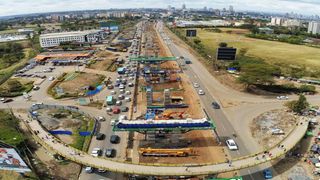
Ongoing construction of the Nairobi Expressway.
Business
Premium
Expressway: Kenyans to pay for road they’ll be taxed to use
What you need to know:
- The Chinese firm is expected to earn an estimated Sh106.8 billion in profits for the 27 years that it will own and operate the double-decker road.
Ambulances, police vehicles, and military vehicles will however be exempted from paying toll fees.
It is a double pain for taxpayers who will pay billions of shillings upfront to relocate utilities on the 27-kilometre Nairobi Expressway and also pay toll fees to use the double-decker highway when it is completed.
In the mini budget before parliament, the National Treasury has allocated Sh5.4 billion for the Nairobi Expressway project being built by a subsidiary of China Road and Bridge Construction (CRBC), the company that build the Standard Gauge Railway (SGR).

The 27.1-kilometre expressway begins at the African Inland Church in Mlolongo and runs through the Central Business District (CBD) and terminates at the James Gichuru Road junction in Westlands.
The allocation has raised fears of double taxation because Kenyans will also be required to pay the contractor to use the road once it is completed at toll stations.
Treasury Cabinet Secretary Ukur Yatani told Nation that the allocation is meant for compensation and movement of utilities such as electricity installations on the road.
The construction will see the relocation of a number of private properties, power cables, optical cables, water pipes, billboards and footbridges.
Construction costs
“There are many displacements that have come up as a result of the road construction. There are a number of people who will be displaced along the way. So the money is the cost of relocation of utilities and some degree of compensation for people who are going to be displaced along the way,”Mr Yatani said.
Mr Yatani explained that this would be the government’s contribution to the project and that it will not fund the construction.
“We are not touching the construction costs. It is them doing it. We are just doing the facilitative role like ensuring there is the tolling act,” he said.
The 27.1-kilometre expressway begins at the African Inland Church in Mlolongo and runs through the Central Business District (CBD) and terminates at the James Gichuru Road junction in Westlands.
The expressway, that is being constructed at a cost of Sh59 billion, is expected to be completed early next year. This works out to about Sh2.1 billion per kilometre, making the most expensive road in the country.
The Transport ministry justifies the cost the road by the fact that it will be a four-lane and six-lane dual carriageway within the existing median of Mombasa Road-Uhuru Highway-Waiyaki Way and will come with10 interchanges.

Construction of pillars along Mombasa Road at the Nyayo Stadium roundabout as seen on January 5, 2021.
The Kenya National Highways Authority (Kenha) said the Chinese firm, which will build the 27.1 km road linking the Jomo Kenyatta International Airport (JKIA) to Nairobi-Nakuru highway, will operate the road for 27 years before handing it over to the state.
Motorists using the road will pay between Sh100 and Sh1,550, depending on the size of the cars and distance travelled.
The rates are based on the dollar trading at Sh103.79 and will be reviewed based on inflation and the rate of Kenya shilling to the dollar, which currently stands at Sh109.17.
This means that the toll charges are dollar-based and will cushion the Chinese operator from exchange rate losses.
The Chinese firm is expected to earn an estimated Sh106.8 billion in profits for the 27 years that it will own and operate the double-decker road.

Road traffic in Nairobi.
High-capacity vehicles like transit lorries will pay between Sh500 and Sh1,550 to use the expressway depending on distance travelled, while low-capacity vehicles like saloon cars will pay between Sh100 and Sh310, according to the Kenya Gazette.
Motorbikes and three-wheelers commonly known as Tuk Tuks are banned from using the double-decker road whose construction started early this year and will take two years to complete.
Ambulances, police vehicles, and military vehicles will however be exempted from paying toll fees.
Transport Cabinet Secretary James Macharia, in a recent tour of the project, said the Chinese contractors had completed more than 15 percent of the work by December 2020, and is ahead of schedule.
Toll fees
President Uhuru Kenyatta launched the construction of the project in October 2019 and it was expected to take 24 months. The project adopts a fully enclosed, full interchange and full toll collection mode, which means that motorists who have not paid will not be able to use it.
The road is being fronted as one of the biggest Build Operate Transfer (BOT) projects which will see the company operate it after construction, collect toll fees to recoup its investment and hand it over to the government after it gets its money back.

The expressway, that is being constructed at a cost of Sh59 billion, is expected to be completed early next year.
“We are not borrowing money. It is purely private sector investment,”Mr Macharia, who has already gazetted the highway as a toll road, said.
Toll fees were introduced in the late 1980s but were scrapped in the mid-90s in favour of the roads maintenance levy currently charged at Sh18 per litre for petrol and diesel.





